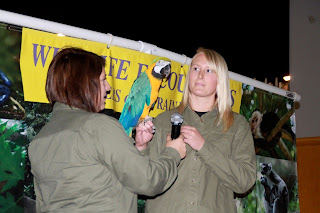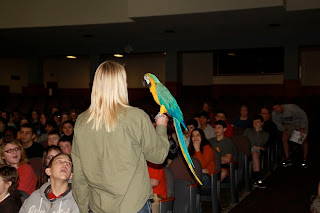 |
| Our first animal is Pickles! He's saying hello to the kids. |
The second week came and went already, and with 13 shows it flew by so fast! Our routine is becoming better and better and I feel like our program we offer to the children is improving every day.
 |
| The kids love Pickles, a lot of them say he's their favorite. |
We are becoming more and more comfortable and excited about being up there in front of sometimes 700 children and teachers. The best part is when people come up to us afterwards and tell us that they can tell we love what we do, because we bring so much enthusiasm and passion to each show.
 |
| We love interacting with the audience, we ask a lot of questions and they learn a lot! |
Here are some details of our second week on the road:
We taught in three states: Michigan, Ohio, Pennsylvania
We put on thirteen different shows in nine different schools.
We reached 3,500 kids and hundreds of teachers.
 |
| Some of the kids are chosen as volunteers to hold the Madagascar Hissing cockroaches. |
We had some interesting things happen this week also. One private Lutheran school actually had us do our program as a recruitment for coming to their school. Another school we went to had used our program as an incentive for great behavior, so out of 450 children out of that elementary, 50 weren't able to go because of bad behavior. At that school two reporters showed up and took pictures and facts down to write articles in their newspapers.
 |
| Ellie showing off for the kids. |
One of the most fulfilling shows we did was at a public school in Cleveland, Ohio. This school was in the center of a very impoverished area, and most of the children came from economically disadvantaged homes. Yet despite all the odds, the school holds very high expectations of character and grades over the students, which builds personal responsibility and confidence in the students. Before, during and after the show, this confidence and good behavior showed tremendously in the students.
 |
| She loves to jump up on Jess and I during the show. |
These students turned out to be one of our most attentive and interested audiences, and afterwards as they were all walking out one by one, several of the little girls ran up to Jess and I and gave us hugs. It warmed our hearts to see the joy and gratitude on their faces. Also, a teacher came up to us after the show and told us she had a phobia of spiders, but wanted to hold Carl our tarantula to face her fears. That was so awesome to hear, and we eased her into holding Carl on her hand, and letting him walk up her arm a little. She stood their shaking as Carl eased up on to her hand, but afterwards was so happy about facing something that scary to her. We were really proud!
 |
| Little Maki is our last animal of the program. He usually clings to his otter, but has been jumping more for the kids. |
One of the most moving moments we had last week was at the end of one of our shows. Towards the end I like to say my favorite quote:
"In the end we will conserve only what we love. We will love only what we understand. We will understand only what we are taught."
-Baba Dioum
After I say this, I explain that this is why Jess and I do what we do. No we are not in the rain forest directly trying to stop deforestation and habitat destruction, but we are right here right now in front of all you kids hoping to get you excited enough about these animals so that one day one of you might want to visit the rain forest or even try and save it. Then I hand the microphone to Jess to finish up our conclusion. She explains how these animals will never be able to live outside in the wild again, and then she asks if everyone can do us and the animals a favor. Of course everyone usually enthusiastically says "Yeah!". Then she asks everyone to get outside as much as they can, because when you are outside in nature you start to love it and appreciate it more, and we tend to protect the things we love.
After we concluded with this, a little girl came up to Jess as we were putting things away. She pointed to our banner which has a picture of a beautiful rain forest, right next to a picture of a completely decimated area of stumps and dead shrubbery after people clear cutted parts of a rain forest.
 |
| At current rates of deforestation, over 55% of the Amazon Rain Forest will be completely gone by 2030. |
Jess wrote the following about what happened next:
When the little girl came up to me she looked very bothered and I could tell her mind was racing. She pointed to the pictures on our banner and said, "How can people take something that is so beautiful and turn it in to something so ugly." She looked sad and said how much she loved all of the animals she had seen during our program. For some reason this question really caught me off guard. Although simply put by a little girl it proved to be a very hard question to answer.
So in a fast simple way as she was getting ready to leave with her class I did my best to answer her question. I told her that sometimes people take things without thinking about the effects they will have later, and sometimes people also take too much, and consume much more than they have to. I then explained to her that the more we get outside and see what nature has to offer us the more we will love it and feel connected to it, and as humans we tend to protect the things we love. I ended by just telling her to always try to give more than you take in every situation in life, even when talking about the earth that supports us and all other living things. I hope she got something out of my answer, but most of all I hope she goes home with something from our program because education is really the key.
`








